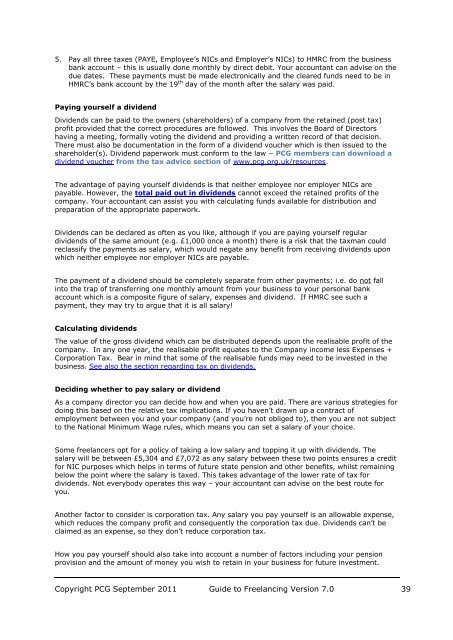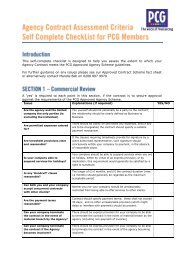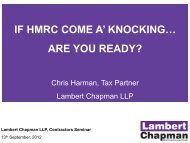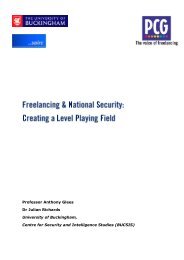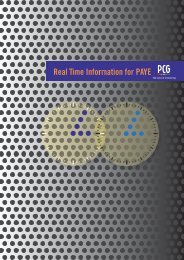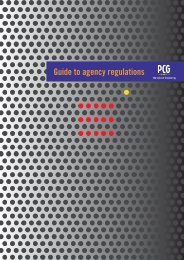Guide to Freelancing - PCG
Guide to Freelancing - PCG
Guide to Freelancing - PCG
Create successful ePaper yourself
Turn your PDF publications into a flip-book with our unique Google optimized e-Paper software.
5. Pay all three taxes (PAYE, Employee‟s NICs and Employer‟s NICs) <strong>to</strong> HMRC from the business<br />
bank account – this is usually done monthly by direct debit. Your accountant can advise on the<br />
due dates. These payments must be made electronically and the cleared funds need <strong>to</strong> be in<br />
HMRC‟s bank account by the 19 th day of the month after the salary was paid.<br />
Paying yourself a dividend<br />
Dividends can be paid <strong>to</strong> the owners (shareholders) of a company from the retained (post tax)<br />
profit provided that the correct procedures are followed. This involves the Board of Direc<strong>to</strong>rs<br />
having a meeting, formally voting the dividend and providing a written record of that decision.<br />
There must also be documentation in the form of a dividend voucher which is then issued <strong>to</strong> the<br />
shareholder(s). Dividend paperwork must conform <strong>to</strong> the law – <strong>PCG</strong> members can download a<br />
dividend voucher from the tax advice section of www.pcg.org.uk/resources.<br />
The advantage of paying yourself dividends is that neither employee nor employer NICs are<br />
payable. However, the <strong>to</strong>tal paid out in dividends cannot exceed the retained profits of the<br />
company. Your accountant can assist you with calculating funds available for distribution and<br />
preparation of the appropriate paperwork.<br />
Dividends can be declared as often as you like, although if you are paying yourself regular<br />
dividends of the same amount (e.g. £1,000 once a month) there is a risk that the taxman could<br />
reclassify the payments as salary, which would negate any benefit from receiving dividends upon<br />
which neither employee nor employer NICs are payable.<br />
The payment of a dividend should be completely separate from other payments; i.e. do not fall<br />
in<strong>to</strong> the trap of transferring one monthly amount from your business <strong>to</strong> your personal bank<br />
account which is a composite figure of salary, expenses and dividend. If HMRC see such a<br />
payment, they may try <strong>to</strong> argue that it is all salary!<br />
Calculating dividends<br />
The value of the gross dividend which can be distributed depends upon the realisable profit of the<br />
company. In any one year, the realisable profit equates <strong>to</strong> the Company income less Expenses +<br />
Corporation Tax. Bear in mind that some of the realisable funds may need <strong>to</strong> be invested in the<br />
business. See also the section regarding tax on dividends.<br />
Deciding whether <strong>to</strong> pay salary or dividend<br />
As a company direc<strong>to</strong>r you can decide how and when you are paid. There are various strategies for<br />
doing this based on the relative tax implications. If you haven‟t drawn up a contract of<br />
employment between you and your company (and you‟re not obliged <strong>to</strong>), then you are not subject<br />
<strong>to</strong> the National Minimum Wage rules, which means you can set a salary of your choice.<br />
Some freelancers opt for a policy of taking a low salary and <strong>to</strong>pping it up with dividends. The<br />
salary will be between £5,304 and £7,072 as any salary between these two points ensures a credit<br />
for NIC purposes which helps in terms of future state pension and other benefits, whilst remaining<br />
below the point where the salary is taxed. This takes advantage of the lower rate of tax for<br />
dividends. Not everybody operates this way – your accountant can advise on the best route for<br />
you.<br />
Another fac<strong>to</strong>r <strong>to</strong> consider is corporation tax. Any salary you pay yourself is an allowable expense,<br />
which reduces the company profit and consequently the corporation tax due. Dividends can‟t be<br />
claimed as an expense, so they don‟t reduce corporation tax.<br />
How you pay yourself should also take in<strong>to</strong> account a number of fac<strong>to</strong>rs including your pension<br />
provision and the amount of money you wish <strong>to</strong> retain in your business for future investment.<br />
Copyright <strong>PCG</strong> September 2011 <strong>Guide</strong> <strong>to</strong> <strong>Freelancing</strong> Version 7.0 39


